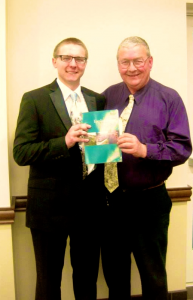May 19, 2015
Desertion During the Civil War
By: Daniel Franch, Honors College Senior
 My journey of getting a paper published in Explorations started the fall of my junior year here at ECU. HIST 2000 Introduction to History is a class that all history majors have to take as an introduction to the field of history. The class is writing intensive, so I knew that I was going to be writing often in that class. Fortunately, I had the pleasure of taking HIST 2000 with Dr. Dudley, for he conveyed his passion for studying history to most of the students in that class and is a great writer. As part of our writing responsibilities, Dr. Dudley gave all of us a yellow folder in which we would store all of our writing assignments. On the left side of the inside of the folder, we had to write aspects of our writing that we needed to fix. This helped me grow as a writer tremendously, and I learned the evil of using dangling prepositions in a sentence.
My journey of getting a paper published in Explorations started the fall of my junior year here at ECU. HIST 2000 Introduction to History is a class that all history majors have to take as an introduction to the field of history. The class is writing intensive, so I knew that I was going to be writing often in that class. Fortunately, I had the pleasure of taking HIST 2000 with Dr. Dudley, for he conveyed his passion for studying history to most of the students in that class and is a great writer. As part of our writing responsibilities, Dr. Dudley gave all of us a yellow folder in which we would store all of our writing assignments. On the left side of the inside of the folder, we had to write aspects of our writing that we needed to fix. This helped me grow as a writer tremendously, and I learned the evil of using dangling prepositions in a sentence.
For the final research paper in HIST 2000, I chose to research the causes of desertion among Confederate soldiers from North Carolina during the Civil War. Ever since middle school, I have been fascinated by the Civil War for its carnage and drama as family and friends were forced to fight against each other. In reading previous books about the Civil War in North Carolina, I learned that desertion was a serious problem for General Robert E. Lee’s Army of Northern Virginia, especially after 1863, and that many of the soldiers who deserted were from North Carolina regiments. This sparked my curiosity for this topic and made me choose it as a research topic for my final paper. With Dr. Dudley’s advice, I narrowed my focus from soldiers across the Confederacy to just soldiers from North Carolina.
As the Civil War progressed, desertion amongst Confederate soldiers infected the Confederate Army like a poisonous cancer. Although North Carolina mustered more troops to fight for the Confederacy than any other Confederate state, North Carolina also had one of the highest rates of desertion. In this paper, I examined the causes behind Confederate desertion of North Carolina soldiers. One main factor that motivated North Carolina soldiers to desert was desperate letters written by wives, sisters, and mothers begging their loved ones to stop fighting and come home amidst food shortages and other hardships. A second main factor was Southern elites’ broken promises to look after soldiers’ families by refusing to grow more food crops instead of the more profitable cotton. Lastly, the inability of the leaders of the Confederate Army and President Jefferson Davis to take substantive measures to punish deserters or prevent others from deserting early in the war allowed desertion to spread with deadly effect as the war continued. While rigorously scrutinizing numerous primary and secondary documents, I argued that appeals from family and friends at home, disdain for Confederate nationalism, Union occupation of large swaths of territory, and the failure of southern elites to keep their promises all drove Confederate soldiers from North Carolina to desert. A complete copy of my paper can be found online in the current issue of Explorations here.
After countless hours of research both from the undergraduate library at UNC Chapel Hill and in the North Carolina and Special Collections in Joyner Library at East Carolina, I discovered a plethora of primary and secondary source documents to use for this paper. The most exciting part of writing this paper was searching through numerous old manuscripts in the Special Collections on the fourth floor of Joyner Library, because never before had I read or held original documents written by soldiers and their family members.
After writing this paper and turning it in for a grade, Dr. Dudley approached me about the possibility of publishing it. I had heard about other undergraduate students publishing manuscripts in journals before, and I had tried to publish a research paper for a class I took my first year at ECU. This time I knew I had written a quality piece of historical research, so the most practical choice was to submit the paper to the reviewers for Explorations, which is the Journal of Undergraduate Research and Creative Activities for the State of North Carolina.
The submission process was simple, but I had to revise my draft three times before it was finally deemed publishable. This revision process helped me catch a few grammar and syntax mistakes, and it helped me improve the content of my paper as well. As much as I love history, I know that many people do not understand its significance and value, so getting this paper published was extremely gratifying and the ultimate reward for all of those long hours in the library and staying up countless late nights. I would advise all undergraduate students, especially Honors College students, to submit well-written research papers to Explorations.
- Categories:
- Honors College
